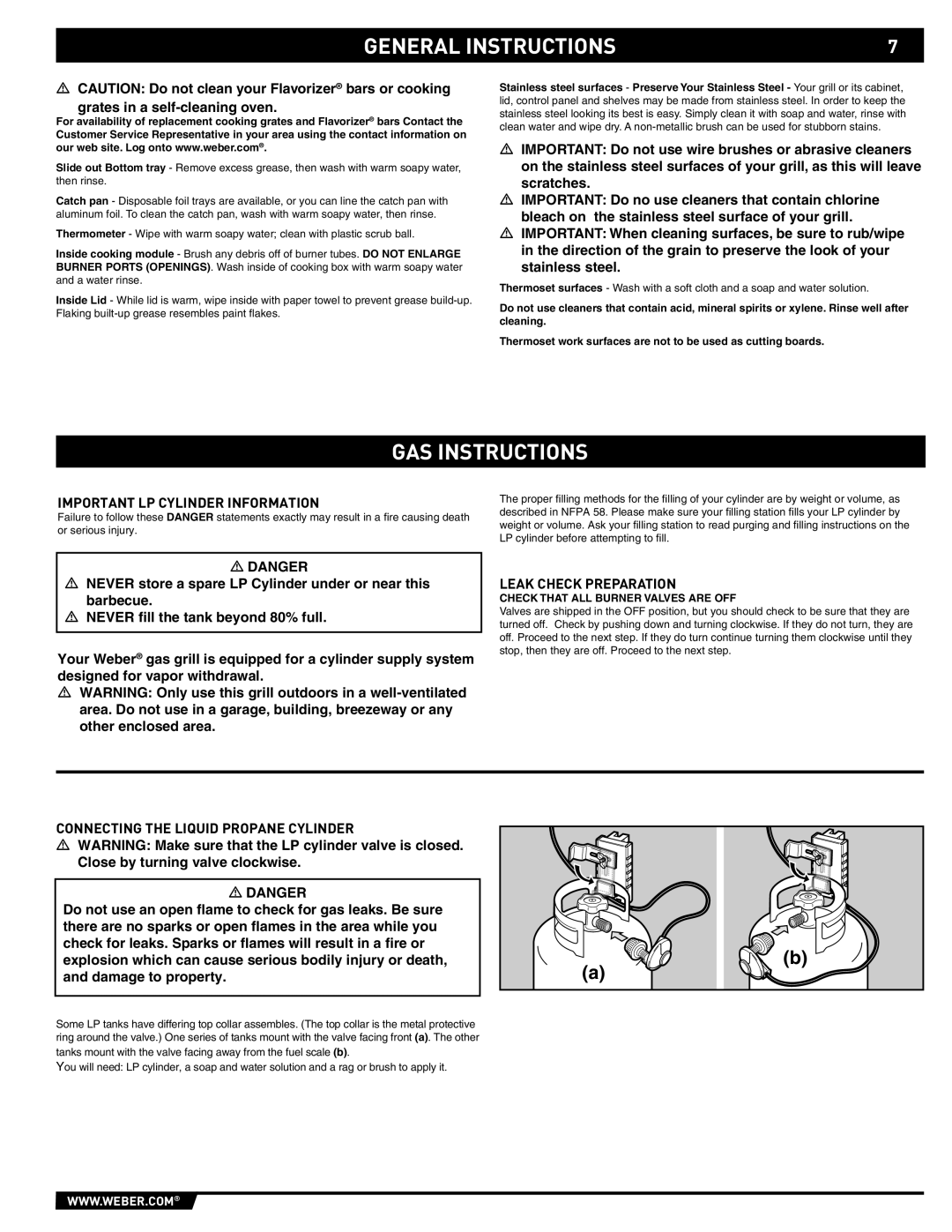
GENERAL INSTRUCTIONS | 7 |
|
|
CAUTION: Do not clean your Flavorizer® bars or cooking grates in a
For availability of replacement cooking grates and Flavorizer® bars Contact the Customer Service Representative in your area using the contact information on our web site. Log onto www.weber.com®.
Slide out Bottom tray - Remove excess grease, then wash with warm soapy water, then rinse.
Catch pan - Disposable foil trays are available, or you can line the catch pan with aluminum foil. To clean the catch pan, wash with warm soapy water, then rinse.
Thermometer - Wipe with warm soapy water; clean with plastic scrub ball.
Inside cooking module - Brush any debris off of burner tubes. DO NOT ENLARGE BURNER PORTS (OPENINGS). Wash inside of cooking box with warm soapy water and a water rinse.
Inside Lid - While lid is warm, wipe inside with paper towel to prevent grease
Stainless steel surfaces - Preserve Your Stainless Steel - Your grill or its cabinet, lid, control panel and shelves may be made from stainless steel. In order to keep the stainless steel looking its best is easy. Simply clean it with soap and water, rinse with clean water and wipe dry. A
IMPORTANT: Do not use wire brushes or abrasive cleaners on the stainless steel surfaces of your grill, as this will leave scratches.
IMPORTANT: Do no use cleaners that contain chlorine bleach on the stainless steel surface of your grill. IMPORTANT: When cleaning surfaces, be sure to rub/wipe in the direction of the grain to preserve the look of your stainless steel.
Thermoset surfaces - Wash with a soft cloth and a soap and water solution.
Do not use cleaners that contain acid, mineral spirits or xylene. Rinse well after cleaning.
Thermoset work surfaces are not to be used as cutting boards.
GAS INSTRUCTIONS
IMPORTANT LP CYLINDER INFORMATION
Failure to follow these DANGER statements exactly may result in a fi re causing death or serious injury.
The proper fi lling methods for the fi lling of your cylinder are by weight or volume, as described in NFPA 58. Please make sure your fi lling station fi lls your LP cylinder by weight or volume. Ask your fi lling station to read purging and fi lling instructions on the LP cylinder before attempting to fi ll.
DANGER
NEVER store a spare LP Cylinder under or near this barbecue.
NEVER fill the tank beyond 80% full.
Your Weber® gas grill is equipped for a cylinder supply system designed for vapor withdrawal.
WARNING: Only use this grill outdoors in a
LEAK CHECK PREPARATION
CHECK THAT ALL BURNER VALVES ARE OFF
Valves are shipped in the OFF position, but you should check to be sure that they are turned off. Check by pushing down and turning clockwise. If they do not turn, they are off. Proceed to the next step. If they do turn continue turning them clockwise until they stop, then they are off. Proceed to the next step.
CONNECTING THE LIQUID PROPANE CYLINDER
WARNING: Make sure that the LP cylinder valve is closed. Close by turning valve clockwise.
DANGER
Do not use an open flame to check for gas leaks. Be sure there are no sparks or open flames in the area while you check for leaks. Sparks or flames will result in a fire or explosion which can cause serious bodily injury or death, and damage to property.
Some LP tanks have differing top collar assembles. (The top collar is the metal protective ring around the valve.) One series of tanks mount with the valve facing front (a). The other tanks mount with the valve facing away from the fuel scale (b).
You will need: LP cylinder, a soap and water solution and a rag or brush to apply it.
(b) |
(a) |
WWW.WEBER.COM®
